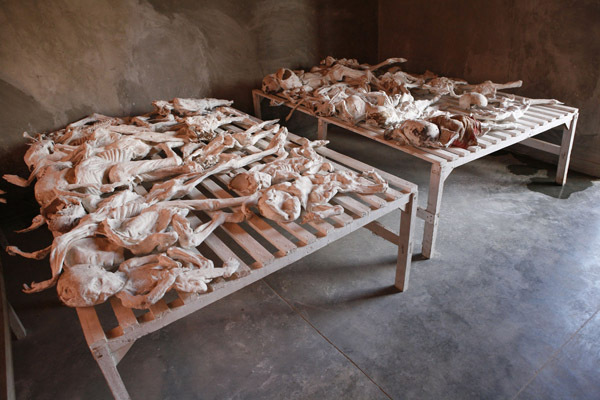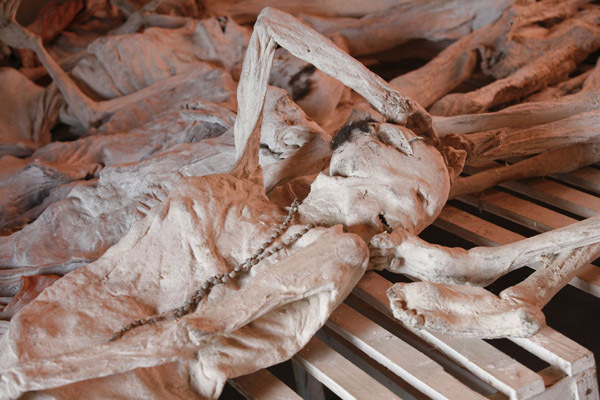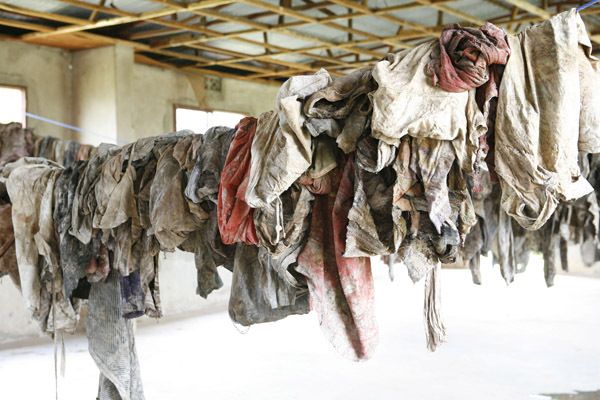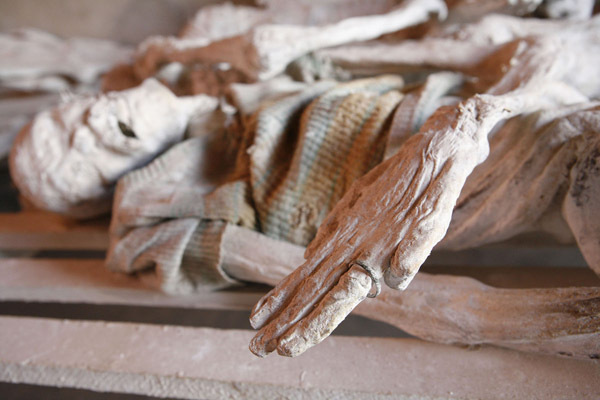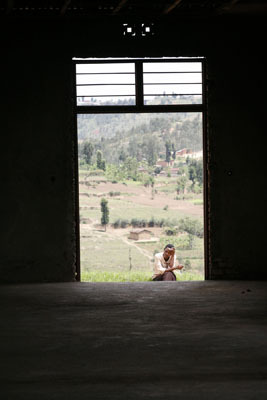
It's that time of year again in Rwanda. April 6th marks the anniversary of the plane crash that triggered one hundred days of genocide in 1994. But in the words of William Faulkner, "The past is not dead. It isn't even past." I am traveling across Rwanda with friends from the US, UK and Canada. My companions marvel at a tropical paradise of lush mountains and rainforests, home to exotic flora and fauna. Yet along with the intoxicating beauty is the knowledge that in April 1994 there were barricades on each road, manned by red-eyed, machete-wielding militia, pumped up on hate propaganda.
Murambi genocide memorial perches on a summit in southern Rwanda. As far as the eye can see there are green peaks, valleys where rice grows, and hills where women pick tea: an unlikely venue for one of the twentieth century's great brutalities.
John, our local driver, trails after us as we walk from room to room, looking at 800 bodies unearthed from a mass grave of 50,000. The cadavers were treated with lime and laid out in the former school to which they had fled in April 1994. The Hutu extremist militia had surrounded the hill and then waited. After a week, during which their prisoners had no food or water, the militia moved in with their machetes. The facial expressions of their victims are frozen at the moment of death. Some grasp children to them, others grip rosary beads.
The site custodian survived by lying under bodies, pretending to be dead. He explains that French soldiers helped the Hutu militia dig the mass grave with mechanical diggers. Then they made a volleyball court on top.
The Rwandan government exhumed 800 bodies, taking to heart General Eisenhower's warning when the Nazi death camps were opened: unless you provide irrefutable evidence of what happened, it won't be long before someone denies it ever occurred.
We gaze numbly at the mountains stretching into the distance. The scene is as serene as an Oriental painting, but it is also the epicentre of hell. My companions are supporters of the non-profit, Network for Africa, and for most of our trip we have visited life-enhancing projects where resilient genocide orphans and widows are rebuilding their lives. But at the memorial we confront what the orphans and widows endured.
From Murambi we drive in silence, three hours west to Lake Kivu on the border with the Democratic Republic of Congo. John, a toothy twenty-six year old, is usually animated, pointing out sites on our route. But after the memorial, his handsome features are strained to blankness.
He drives us past children selling eggs and charcoal at the road side, and men balancing vast bunches of green bananas on their bicycle seats as they trudge up hill. We arrive in the border town of Cyangugu in a downpour, the red earth like glue, the stores like dark, grubby caves filled with bright Chinese plastic bowls and buckets.
At dinner a white South African with a meaty, flushed face and bleary eyes arrives at our table uninvited. He plants his bottle of Primus beer before him with exaggerated care. As the empty bottles accumulate he says he is prospecting for minerals across the border. Human Rights Watch has documented Congo's 'curse of gold': war lords enslave locals to work the mines, raping the women and causing hundreds of thousands to flee to refugee camps. The Congolese army also abuses and terrorises the people they are ostensibly protecting. But as long as cell phone makers needed coltan, the market for blood minerals thrives, and our South African companion will be busy.
At the other end of the table, the silent John keeps pace with the smuggler, bottle for bottle, eyes fixed on the remains of an oily, gristly meal none of us can stomach.
Later, standing on our balcony, we see the smuggler stagger into the garden and urinate on the roses, belching at an audience of humming nocturnal insects.
In the morning the sky is clear and Lake Kivu sparkles like a long thin strip of mercury, running north-south between Rwanda and Congo. On either side the dazzlingly emerald mountains tower above the water. The road hugs the lake all the way north to Gisenyi, and the view is never less than spectacular. During the genocide, the shore was littered with bloated bodies. Now there is little traffic on the lake except for Rwandan coastguards, watchful for Hutu extremists who fled to Congo in the final days of the genocide.
John, badly hung-over, lies in the back, his long, slender arms draped over our luggage.
The next day we walk across the Gisenyi-Goma border, from perfectly manicured Rwanda to one of Dante's circles of hell, lawless and ragged. In 1994 a million refugees streamed into Goma, fearing the Tutsi-led rebels would kill any Hutu they encountered. Among the innocent were those who committed the genocide. The militia promptly reformed in the refugee camps, protected by the French government. To this day they rampage across the region, smuggling minerals and killing civilians.
As we wander through Goma, John draws aside Henry, the only man with us. John explains his parents and his brothers and sisters took shelter at the Murambi school. He'd never been there before our visit. He wants justice, he says, because without justice there can be no meaningful peace or reconciliation. Then John pauses. "I never told anyone before, about what happened to us in 1994."
In Rwanda the past really isn't past at all.
Photos by Melissa Musgrove
Postscript: Network for Africa supporters are sponsoring John through university as he makes up for education missed during the genocide.Rebecca Tinsley founded Network for Africa (www.Network4Africa.org) in 2007. It supports projects helping survivors rebuild their lives. Her novel about Africa, "When The Stars Fall To Earth" www.starsfalltoearth.com is available through online bookstores. FB http://www.com/#!whenthestarsfalltoearthFB http://www.com/#!becky.tinsley

